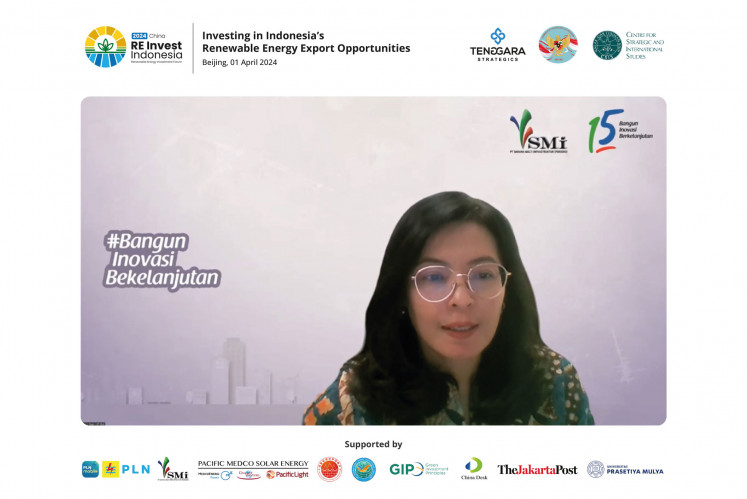Indonesia’s lack of literary tradition
The success of adopting the local Malay dialect as our national language, coupled with the adoption of the Latin alphabet, resulted in only 3.5 percent illiteracy rate in 2015, according to the Education and Culture Ministry.
Change Size
 Literacy warrior: Kiswanti, a 54-year-old literacy activist who set up the Lebak Wangi Reading Room in Parung village, Bogor, West Jakarta, stands next to a sign in her community library, emblazoned with the words: “WARNING: There are many things you cannot find on Google,” encouraging reading habits in a world bombarded by quick fixes provided by the internet. (JP/Sebastian Partogi)
Literacy warrior: Kiswanti, a 54-year-old literacy activist who set up the Lebak Wangi Reading Room in Parung village, Bogor, West Jakarta, stands next to a sign in her community library, emblazoned with the words: “WARNING: There are many things you cannot find on Google,” encouraging reading habits in a world bombarded by quick fixes provided by the internet. (JP/Sebastian Partogi)
Sebastian Partogi
The Jakarta Post/Depok, West Java
The success of adopting the local Malay dialect as our national language, coupled with the adoption of the Latin alphabet, resulted in only 3.5 percent illiteracy rate in 2015, according to the Education and Culture Ministry.
The sad fact is that, although most Indonesians are literate, this ability to read and write is not followed by proper reading habits and a strong literary tradition.
Last year, the Central Connecticut State University in New Britain in the United States ranked Indonesia the second-lowest out of 61 measurable countries for its “literacy behavior characteristics” ranging from reading habits, book availability and years of schooling, among others.
“We don’t have a tradition of separating science and religion. Therefore, many people are afraid of being accused of blasphemy or tarnishing local traditions if they write or express something that runs contrary to local religious and cultural practices,” Mohammad explained.
He added that as long as intellectuals were afraid to express their ideas openly through their writings, a proper ecosystem for a literary tradition, which encouraged reading habits, would never flourish in Indonesia.
He cited the United States as a good example on how science and religion have been separated, resulting in a strong literary tradition and scientific advancements.
When the administration of George W. Bush -- a conservative Christian -- faced a class action suit by religious fundamentalists to teach the creationist version of science in schools, the lawsuit failed despite the Constitutional Court judge being a conservative himself, for example.
Even Pakistan is able to separate religion and science.
“For instance, Pakistani physics Nobel prize laureate Abdus Salam, despite being a devout Muslim, was able to make peace with the fact that his scientific findings ran contrary to his faith,” Mohammad said.
Grassroots activism
Aside from the gloom and doom, here’s good news for Indonesia. Many grassroots activists are working hard to promote a literary tradition among Indonesians and change the status quo.
In Parung village, Bogor, West Jakarta, a 54-year-old woman named Kiswanti has been running a community library named Warabal (Warung Baca Lebak Wangi; Lebak Wangi Reading Room).
Hundreds of children and adults alike flock to her weekly creative classes, not to mention those who come to the library to read its books and periodicals.
“I don’t want children, who can’t afford to go to school, to miss out on opportunities. They can in fact still acquire knowledge by reading books,” said Kiswanti, who dropped out of school after finishing sixth grade.
The activities at her mobile library include reading poems together and encouraging children to write their own.
Similar initiatives encouraging children to think critically are also facilitated by a community called Rumah Cerita (House of Stories). It has been entrusted by the ASEAN Literary Festival to organize a National Literary Gymboree aimed at students from elementary to senior high school.
“We encourage [senior high school] students to join our young journalist workshop to apply critical thinking by interviewing people, probing deeper as well as verifying their answers on the subject of literature,” Rumah Cerita founder Aqmarina Andira said.
A more in-depth version of this article will be published in The Jakarta Post on Oct. 24.










